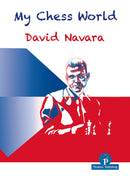Description
My Chess World - David Navara
This book is not a pure (auto)biography, rather a games collection. It consists mainly of interesting high-class games played by me, including many losses. Most of the games are preceded by accompanying texts, which vary from essays to tournament reports. The title of the book might seem presumptuous, but I wanted to show how I see or experience the competitions without denying the chess worlds of others. While the texts are mostly light and subjective, at the same time I tried hard to stick to the facts and provide some food for thought.
There might appear to be nothing easier than annotating your own games, but it’s actually not that easy. I often come up against the so-called Navara Antinomy:
Interestingly, my writing style differs from my reading tastes, not only in writing articles, but maybe even more so in annotating games. As a reader, I like concise and clear comments without too many variations, whereas as an annotator, the unrealised possibilities generally appear too important to leave out. I would like to assure you that I offer the reader my personal insights into how a player thinks, combined with important computer precision.
I made extensive use of chess programs in the annotations, but I generally do not reference them. When I do refer to Stockfish, Komodo or other engines, it indicates the absence of my own thoughts, rather like the expressions ‘anyway’, ‘that is to say’ or ‘well’ in colloquial language.
I recall how Pavel Matocha once told me that I should give fewer variations, but more diagrams and written commentary. He emphasised that many people don’t play through annotations, and generally skip long variations. I had to smile, because I myself belong to that group of readers. Despite this, I haven’t learnt how to write concisely. Often something jumps into my head and I diverge completely from the original topic. What did I actually want to write about?
About my own play of course. I can immodestly claim that I have played many interesting games in the course of my career. Rather more humbly, I should add that they were often far from perfect.
No matter how I write this book, it couldn’t include all the games I would like to see in it. For this publication, I have chosen almost exclusively games played at a classical (slow) time control. I generally chose games against strong opponents and avoided games which I have already annotated for ChessBase. I made some changes from the Czech version, and included several games from my most successful competitions.
ISBN 9789492510808, Paperback, 616 pages, Thinkers Publishing
VIEW PDF SAMPLE OF THIS BOOK HERE
This book is not a pure (auto)biography, rather a games collection. It consists mainly of interesting high-class games played by me, including many losses. Most of the games are preceded by accompanying texts, which vary from essays to tournament reports. The title of the book might seem presumptuous, but I wanted to show how I see or experience the competitions without denying the chess worlds of others. While the texts are mostly light and subjective, at the same time I tried hard to stick to the facts and provide some food for thought.
There might appear to be nothing easier than annotating your own games, but it’s actually not that easy. I often come up against the so-called Navara Antinomy:
- Substantial games are interesting.
- Substantial games require extensive annotations.
- Extensive annotations are boring.
Interestingly, my writing style differs from my reading tastes, not only in writing articles, but maybe even more so in annotating games. As a reader, I like concise and clear comments without too many variations, whereas as an annotator, the unrealised possibilities generally appear too important to leave out. I would like to assure you that I offer the reader my personal insights into how a player thinks, combined with important computer precision.
I made extensive use of chess programs in the annotations, but I generally do not reference them. When I do refer to Stockfish, Komodo or other engines, it indicates the absence of my own thoughts, rather like the expressions ‘anyway’, ‘that is to say’ or ‘well’ in colloquial language.
I recall how Pavel Matocha once told me that I should give fewer variations, but more diagrams and written commentary. He emphasised that many people don’t play through annotations, and generally skip long variations. I had to smile, because I myself belong to that group of readers. Despite this, I haven’t learnt how to write concisely. Often something jumps into my head and I diverge completely from the original topic. What did I actually want to write about?
About my own play of course. I can immodestly claim that I have played many interesting games in the course of my career. Rather more humbly, I should add that they were often far from perfect.
No matter how I write this book, it couldn’t include all the games I would like to see in it. For this publication, I have chosen almost exclusively games played at a classical (slow) time control. I generally chose games against strong opponents and avoided games which I have already annotated for ChessBase. I made some changes from the Czech version, and included several games from my most successful competitions.
ISBN 9789492510808, Paperback, 616 pages, Thinkers Publishing
VIEW PDF SAMPLE OF THIS BOOK HERE
Payment & Security
Your payment information is processed securely. We do not store credit card details nor have access to your credit card information.


